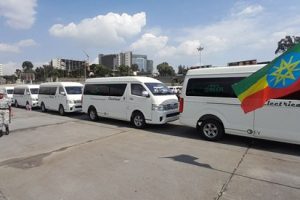
BY HIZKEL HAILU
It was learnt that the national flagship project, the Grand Ethiopian Renaissance Dam /GERD/ has successfully commenced initial power generation trial since last six months. And yesterday it was also announced that the second turbine has started to generate energy. The ninth unit turbine which was officially commenced yesterday has a capacity to produce about 270 MW. The two turbines will have a capacity to produce about 540 MW of electricity, but the dam will generate 5,150 MW once filled to capacity.
While officially launched the commencement yesterday, Prime Minister Abiy Ahmed (PhD) said that such sustainable power will prove a boon for Ethiopia’s economy. He further avowed that Ethiopia’s main interest is to bring light to 60 percent of the population who is suffering in darkness; to save the labor of poor mothers who are carrying wood on their backs in order to get energy.
According to him, the water is generating energy as well as flowing as it previously flowed to Sudan and Egypt due to the effective work on the bottom approach to not to hurt the downstream countries. “We only intend to generate power and change the livelihood of our people,” he noted
Being thankful for Ethiopians and Ethiopians born for their financial, labor, knowledge and even life scarification paid for the construction of the GERD, he congratulated all Ethiopians and friends of Ethiopian for this victory. He also accentuated that the success we achieved in the GERD, export, green legacy and the like are the manifestation of Ethiopia’s prosperity.
On his welcoming speech, GERD Project Manager, Engineer Kifle Horo said that the largest hydroelectric dam in Africa is so far reached 83.3 percent. As to him, the civil work is 95 percent completed while the electromechanical work is completed 61 percent.
Moreover, he accentuated that the dam’s height reached 600 meters above sea level while holding back more than 22 billion cubic meters of water in the dam reservoir. When completed in two and have years, the dam will empower the Ethiopia and African economies with over 5000 megawatts of power.
With some cooperation and wisdom, it was initially possible that the ambitious GERD project could become both a great development project for the Ethiopian people and a model for cooperation between Ethiopia and its neighbors. Through funding from civil servant donations, diaspora support and the sale of bonds to private citizens, the GERD has become a symbol of national pride.
GERD is an Ethiopian hydropower dam and guardian infrastructure asset for the downstream countries against climate change. It is also a means to develop further and prosper together; it can never be a threat for any neighboring countries. Rather it is essential project to boom Ethiopia’s economy, economists and officials agreed.
Following the breaking news about Ethiopia has launched the commencement of the unit nine to generate energy, scholars of the field suggested that Ethiopia will boom its economy and strengthen the regional integration soon.
Approached by Ethiopian Press Agency, an International Water Resource Advisor, Fekiahmed Negash said that the power generation clearly exposed the false accusation of the downstream countries as the dam significantly disrupts the flow of the water.
“If Ethiopia can export the electricity generated from of the GERD for the neighboring countries coupled with assuring electricity accessibility for domestic consumption, it will be possible to generate up to one billion dollar per year. When we start using the energy domestically, we can also use it for industry. This will directly contribute to the development of the country,” he asserted.
Noting that natural resources are important for the development of a country, he recommended that it is important to manage and use the resources sustainably and properly. When countries have wealth, it is important to know the wealth properly and build institutions that can manage it well. Therefore, he added, the power generation is of paramount importance to help the institutions to perform their tasks in building vibrant economy over the country.
According to him, the surplus electricity produced by the GERD will be a steady source of income for Ethiopia, adding that the GERD after its full operation will have greater role in alleviating poverty as well as building regional integration.
He further asserted that the country hopes that additional electricity capacity will help to spur further economic development and allow it to export more to neighboring countries to increase its foreign exchange earnings. Important issue should be clear to the people of Sudan and Egypt and the whole world as well is there is a grave shortage of electricity generated so far in Ethiopia in which about 60 percent of its population is coerced to live in darkness.
According to a document from the Ethiopian Electric Power, Ethiopia is set to start electric transmission to Kenya this year after signing a Power Purchase Agreement (PPA) with the neighboring nation.
The agreement is expected to boost the annual energy export trade of Ethiopia which already has begun exporting electric power to Sudan and Djibouti. The two neighboring nations imported 1,700GWh of electricity in the last twelve months. As per the agreement, Ethiopia will export 200 Megawatt of energy to Kenya in the first phase of the power export, with a plan to increase to 400MW in due course.
In the recently concluded 2021/22 Ethiopian budget year, electric power export to Sudan and Djibouti brought in more than 95.5 million USD, kicking in 2 percent of Ethiopia’s annual revenue from export trade. The latest power purchase agreement will contribute to government’s target to increase annual electric export revenue to 400 million USD with a plan to integrate East African countries through electricity in the near future, the document revealed.
On top of generating hydropower, GERD is an integral part of the Ethiopian economic and political development strategy. Apart from giving light for the rural people, the dam is hoped to provide much needed electricity to industrial development and strengthening the regional integration, he explained.
After GERD’s completion, Ethiopia will become the second-largest producer of electricity in sub-Saharan Africa next to South Africa. Thereupon, it will bring tangible and sustainable economic growth to Ethiopia and the East African countries as well.
Sharing the above idea, Mekonen Abera, an Economist for his part explained that the result of the enormous dam is more than Ethiopia’s need. Therefore, the Ethiopian government expects to export power to neighboring nations, including Djibouti, Eritrea, Kenya, Sudan and South Sudan.
Noting that the dam can also use for the irrigation of over 1.2 million acres of farming land, Mekonen explained that the fertilization of soil will guarantee a successful harvest for millions of Ethiopians farmers. And this is crucial for ensuring the growth of Ethiopia’s economy. Indicating that Ethiopia has been injecting huge amount of foreign currency to this project, he elucidated the completion of this mega project is expected to stabilize inflation through augmenting production and productivity of basic commodities.
He further indicated that Ethiopia could be self-sufficient in food production as the GERD can bring an opportunity for some amount of irrigation. Adding to the point he suggested Ethiopians should not use the dam only for electricity generation. As to him, the operation of the dam will have a capacity to produce surplus agricultural products.
Coupled with achieving the local demand, the country can export electric power to the neighboring countries. So, the economic impact of the project is large as it affects many parts of the sector positively. Besides, the availability of sufficient energy boosts Ethiopian economy in the sectors of construction, industry, agriculture and others, he explained.
Being happiest by the herald which was announced yesterday regarding the 2nd unit power generation, scholars mentioned that benefiting small scale manufacturers to exporters, modernizing agriculture, addressing electric power demand of the society in particular and booming national economy in general coupled with strengthening regional integration are the major advantages of GERD’s completion.
THE ETHIOPIAN HERALD FRIDAY 12 AUGUST 2022





